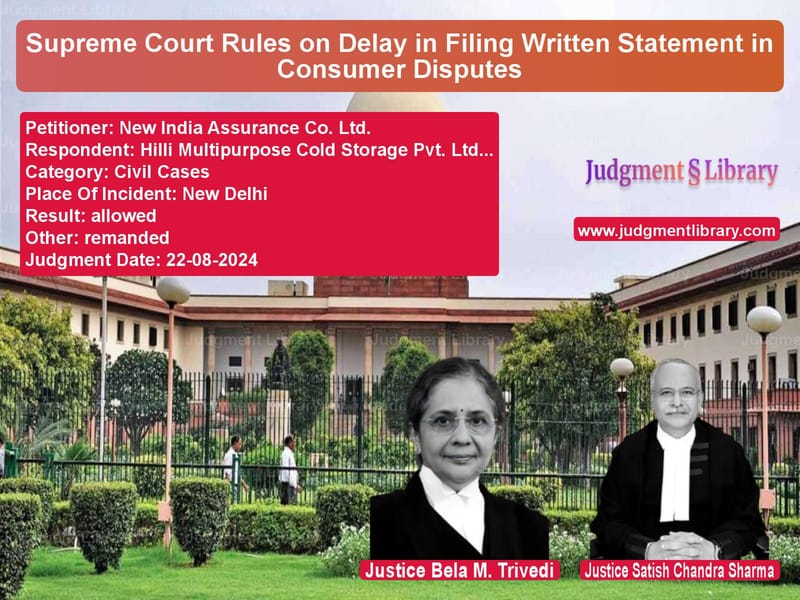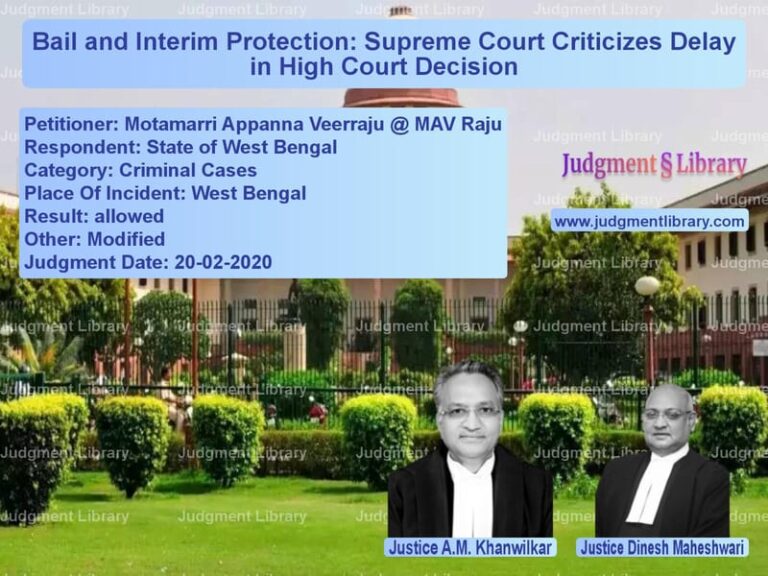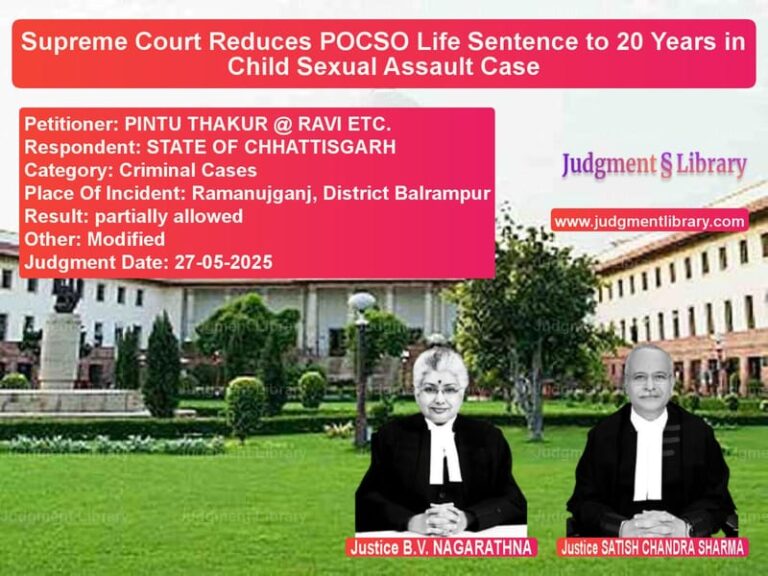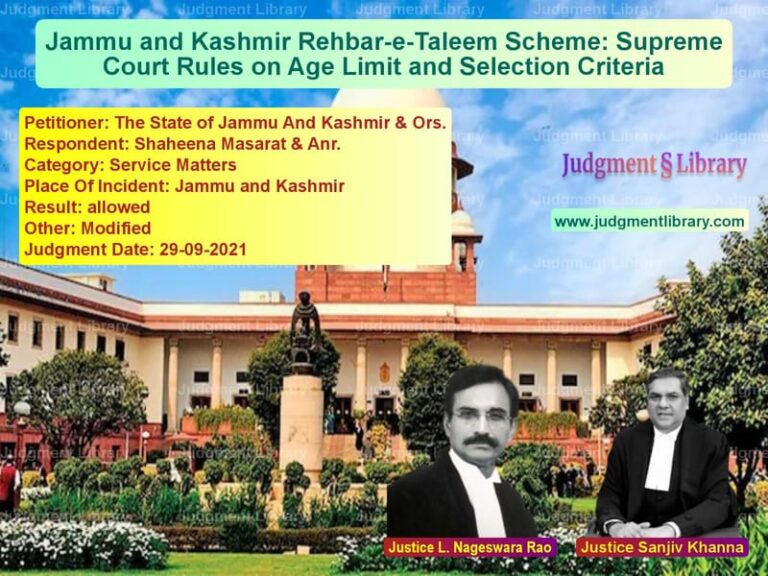Supreme Court Rules on Delay in Filing Written Statement in Consumer Disputes
The Supreme Court of India recently delivered its judgment in the case of New India Assurance Co. Ltd. vs. Hilli Multipurpose Cold Storage Pvt. Ltd., addressing an important issue concerning the delay in filing written statements in consumer disputes. The Court examined whether the National Consumer Disputes Redressal Commission (NCDRC) could condone the delay in filing a written statement beyond the statutory period under Section 13 of the Consumer Protection Act, 1986.
Background of the Case
The case arose from Consumer Complaint No. 52 of 2013, where the Respondent (Hilli Multipurpose Cold Storage) filed a claim for compensation due to the repudiation of their insurance claim. The claim stemmed from losses caused by the sprouting of potatoes at the Respondent’s factory, which was covered under insurance policies with the Appellant, New India Assurance Company.
The NCDRC issued a notice to the Appellant on March 8, 2013, and the written statement was to be filed within 30 days, as per the provisions of the Consumer Protection Act. However, the Appellant failed to submit the written statement on time and applied for condonation of delay on July 23, 2013, citing various reasons for the delay, including the complex nature of the case and internal procedural issues.
The NCDRC, however, rejected the Appellant’s application and forfeited their right to file the written statement, effectively siding with the Respondent. This decision was contested by the Appellant in the Supreme Court.
Legal Issues
- Whether the NCDRC had the authority to condone the delay in filing the written statement beyond the statutory period.
- The applicability of the Consumer Protection Act, 1986, and its mandatory time limit for filing written statements in consumer disputes.
- The interpretation of Section 13 of the Act and whether consumer fora can relax the filing deadline on a case-by-case basis.
Petitioner’s Arguments
New India Assurance Company, the petitioner, presented the following arguments:
- The delay in filing the written statement was unintentional, caused by procedural hurdles within the company, and should therefore be condoned.
- Relying on earlier Supreme Court decisions, such as J.J. Merchant vs. Shrinath Chaturvedi, the Appellant argued that the consumer forum has the discretion to condone delays in filing written statements in appropriate cases.
- The National Consumer Disputes Redressal Commission (NCDRC) should exercise discretion in a manner that allows the Appellant to present its case on merits, as long as no substantial prejudice would be caused to the Respondent.
- The constitutional right to a fair trial should take precedence over procedural technicalities, especially in consumer protection cases involving significant financial stakes.
Respondent’s Arguments
The Respondent, Hilli Multipurpose Cold Storage, opposed the appeal on the following grounds:
- The delay in filing the written statement was excessive, amounting to 79 days beyond the statutory period, which could not be justified.
- There is no provision under the Consumer Protection Act that allows for the unlimited extension of time for filing a written statement. The Appellant had sufficient time to prepare and submit the written statement.
- The Respondent had already suffered significant delays in the adjudication of the case, and further delays would cause undue prejudice.
- Previous rulings, including New India Assurance Co. Ltd. v. Hilli Multipurpose Cold Storage (2020), have emphasized that consumer fora should not routinely condone delays and must strictly adhere to statutory time limits.
Supreme Court’s Observations
The Supreme Court, after considering the arguments and reviewing relevant case law, made the following observations:
- The Court noted that Section 13 of the Consumer Protection Act provides a clear timeline for filing the written statement and that consumer fora must adhere to these timelines.
- While acknowledging the Appellant’s argument that delays were procedural, the Court observed that the consumer protection framework is designed to provide timely relief to consumers, and any delay risks undermining that objective.
- The Court examined previous decisions, such as J.J. Merchant vs. Shrinath Chaturvedi (2002), where the question of condonation of delay in consumer cases was discussed. It was emphasized that while flexibility is essential, repeated delays should not be condoned automatically without sufficient cause.
- The Court also referred to New India Assurance Co. Ltd. v. Hilli Multipurpose Cold Storage (2020), where the Constitution Bench had clarified that the rigours of Section 13 should be complied with mandatorily, though consumer fora may exercise discretion in certain cases.
Final Judgment
On August 22, 2024, the Supreme Court ruled:
- The appeal was allowed, and the Impugned Order passed by the NCDRC was set aside.
- The matter was remanded back to the NCDRC with a direction to adjudicate the application seeking condonation of delay on merits.
- The Court emphasized that in cases where the delay is substantial but not caused by malafide actions, the consumer forum must decide on merits, unless the delay causes extreme prejudice to the other party.
Implications of the Judgment
This judgment has several legal and procedural implications:
- Adherence to Time Limits: The judgment reinforces that the timelines prescribed under the Consumer Protection Act must be adhered to in most cases, but consumer fora have the discretion to condone delays under exceptional circumstances.
- Balance between Fairness and Timeliness: The Court emphasized that while procedural rules must be followed, the right to a fair trial should not be lost due to technicalities, particularly when the delay is caused by procedural lapses.
- Clear Guidelines for Consumer Fora: The ruling provides clarity on how consumer fora should approach the question of condoning delays, particularly in light of the conflicting decisions in earlier cases.
- Case Law Precedents: The decision builds on earlier precedents such as J.J. Merchant (2002) and New India Assurance Co. Ltd. (2020), further refining the legal standards for delay in filing written statements in consumer disputes.
Comparison with Other Precedents
The Supreme Court has dealt with similar issues in previous cases, including:
- J.J. Merchant vs. Shrinath Chaturvedi (2002): The Court held that consumer forums have the power to condone delays, but such powers must be exercised with caution.
- New India Assurance Co. Ltd. v. Hilli Multipurpose Cold Storage (2020): The Constitution Bench decision clarified the mandatory nature of time limits under Section 13 of the Consumer Protection Act and set the standard for condoning delays.
- Reliance General Insurance Co. Ltd. v. Mampee Timbers (2021): The Court allowed a written statement beyond the prescribed period, but only when it was deemed appropriate to avoid injustice.
Conclusion
The Supreme Court’s decision in the case of New India Assurance Co. Ltd. v. Hilli Multipurpose Cold Storage is a critical ruling in the context of the Consumer Protection Act. It ensures that consumer forums have the discretion to condone delays in filing written statements but also sets clear guidelines on when such discretion should be exercised. This decision will impact how consumer disputes are handled in the future, balancing procedural compliance with fairness to both parties.
Read also: https://judgmentlibrary.com/supreme-court-upholds-high-courts-refund-order-in-property-tax-dispute/
Petitioner Name: New India Assurance Co. Ltd..Respondent Name: Hilli Multipurpose Cold Storage Pvt. Ltd..Judgment By: Justice Bela M. Trivedi, Justice Satish Chandra Sharma.Place Of Incident: New Delhi.Judgment Date: 22-08-2024.
Don’t miss out on the full details! Download the complete judgment in PDF format below and gain valuable insights instantly!
Download Judgment: new-india-assurance-vs-hilli-multipurpose-c-supreme-court-of-india-judgment-dated-22-08-2024.pdf
Directly Download Judgment: Directly download this Judgment
See all petitions in Contract Disputes
See all petitions in Consumer Rights
See all petitions in Debt Recovery
See all petitions in Public Interest Litigation
See all petitions in Judgment by Bela M. Trivedi
See all petitions in Judgment by Satish Chandra Sharma
See all petitions in allowed
See all petitions in Remanded
See all petitions in supreme court of India judgments August 2024
See all petitions in 2024 judgments
See all posts in Civil Cases Category
See all allowed petitions in Civil Cases Category
See all Dismissed petitions in Civil Cases Category
See all partially allowed petitions in Civil Cases Category







